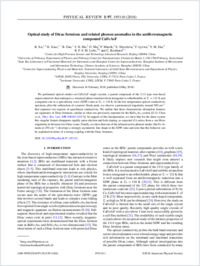Optical study of Dirac fermions and related phonon anomalies in the antiferromagnetic compound CaFeAsF
- Xu, Bing Center for High Pressure Science and Technology Advanced Research, Beijing, China - University of Fribourg, Department of Physics and Fribourg Center for Nanomaterials, Switzerland
- Xiao, H. Center for High Pressure Science and Technology Advanced Research, Beijing, China
- Gao, B. Center for High Pressure Science and Technology Advanced Research, Beijing, China
- Ma, Y. H. Laboratory of Functional Materials, Chinese Academy of Sciences, Shanghai, China
- Mu, G. Laboratory of Functional Materials, Chinese Academy of Sciences, Shanghai, China
- Marsik, Premysl University of Fribourg, Department of Physics and Fribourg Center for Nanomaterials, Switzerland
- Sheveleva, Evgeniia University of Fribourg, Department of Physics and Fribourg Center for Nanomaterials, Switzerland
- Lyzwa, Fryderyk University of Fribourg, Department of Physics and Fribourg Center for Nanomaterials, Switzerland
- Dai, Y. M. Center for Superconducting Physics, Nanjing University, China
- Lobo, R. P. S. M. LPEM, ESPCI Paris, France - Sorbonne Université, Paris, France
- Bernhard, Christian University of Fribourg, Department of Physics and Fribourg Center for Nanomaterials, Switzerland
-
08.05.2018
Published in:
- Physical Review B. - 2018, vol. 97, no. 19, p. 195110
English
We performed optical studies on CaFeAsF single crystals, a parent compound of the 1111-type iron-based superconductors that undergoes a structural phase transition from tetragonal to orthorhombic at Ts=121 K and a magnetic one to a spin density wave (SDW) state at TN=110 K. In the low-temperature optical conductivity spectrum, after the subtraction of a narrow Drude peak, we observe a pronounced singularity around 300cm−1 that separates two regions of quasilinear conductivity. We outline that these characteristic absorption features are signatures of Dirac fermions, similar to what was previously reported for the BaFe2As2 system [Z.-G. Chen et al., Phys. Rev. Lett. 119, 096401 (2017)]. In support of this interpretation, we show that for the latter system this singular feature disappears rapidly upon electron and hole doping, as expected if it arises from a van Hove singularity in between two Dirac cones. Finally, we show that one of the infrared-active phonon modes (the Fe-As mode at 250cm−1) develops a strongly asymmetric line shape in the SDW state and note that this behavior can be explained in terms of a strong coupling with the Dirac fermions.
- Faculty
- Faculté des sciences et de médecine
- Department
- Département de Physique
- Language
-
- English
- Classification
- Physics
- License
- License undefined
- Identifiers
-
- RERO DOC 322578
- DOI 10.1103/PhysRevB.97.195110
- Persistent URL
- https://folia.unifr.ch/unifr/documents/307175
Statistics
Document views: 69
File downloads:
- ber_osd.pdf: 176
